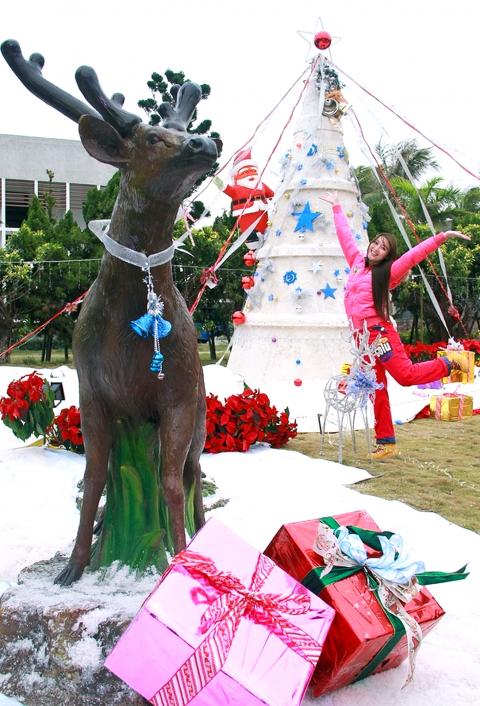A Christmas tree made of salt has been unveiled in Greater Tainan ahead of Christmas Day to promote tourism to the southern city, which was once a hub for salt production.
The 6m tall tree, which is made from 40 tonnes of salt, will be just one of the many attractions at the White Christmas Festival scheduled to be held in the city on Saturday.
“The tree has been dubbed the saltiest Christmas tree in the world,” said Chang Cheng-yuan (張政源), director of the festival’s co-organizer, the Southwest Coast National Scenic Area’s headquarters.

Photo courtesy of the Southwest Coast National Scenic Area Management Office
Standing on a “snowy” patch of ground that is also made from salt, the tree was created by sculptor Wang Sung-kuan (王松冠) over a period of two weeks, Chang said.
“The tree was made out of salt because the organizers wanted to use local material to create their very own, one-of-a-kind Christmas tree,” he said.
“From a traditional perspective, salt is used to drive away evil spirits and misfortunes and is also a symbol of blessing,” Chang added.
Tainan was once home to the Qigu Salt Pans, which were the largest in Taiwan and produced about 60 percent of the country’s salt.
However, the 338-year history of salt production in Taiwan came to an end in 2002 after the salt fields closed, as the local salt industry was unable to compete with cheap imported salt, the director said.
Chang said visitors to the festival could enjoy a variety of salt products, including salt coffee, salt eggs and creative works of art made of salt, and could even make their own salt at an old salt field.
The festival will also feature a traditional hand-puppet show, 300 costumed carol singers and a masquerade party.
The unveiling, a tree-lighting ceremony, was held last Friday to introduce the tree to the public and promote the upcoming festival.

The manufacture of the remaining 28 M1A2T Abrams tanks Taiwan purchased from the US has recently been completed, and they are expected to be delivered within the next one to two months, a source said yesterday. The Ministry of National Defense is arranging cargo ships to transport the tanks to Taiwan as soon as possible, said the source, who is familiar with the matter. The estimated arrival time ranges from late this month to early next month, the source said. The 28 Abrams tanks make up the third and final batch of a total of 108 tanks, valued at about NT$40.5 billion

Travel agencies in Taiwan are working to secure alternative flights for travelers bound for New Zealand for the Lunar New Year holiday, as Air New Zealand workers are set to strike next week. The airline said that it has confirmed that the planned industrial action by its international wide-body cabin crew would go ahead on Thursday and Friday next week. While the Auckland-based carrier pledged to take reasonable measures to mitigate the impact of the workers’ strike, an Air New Zealand flight arriving at Taipei from Auckland on Thursday and another flight departing from Taipei for Auckland on Saturday would have to

A group from the Taiwanese Designers in Australia association yesterday represented Taiwan at the Midsumma Pride March in Melbourne. The march, held in the St. Kilda suburb, is the city’s largest LGBTQIA+ parade and the flagship event of the annual Midsumma Festival. It attracted more than 45,000 spectators who supported the 400 groups and 10,000 marchers that participated this year, the association said. Taiwanese Designers said they organized a team to march for Taiwan this year, joining politicians, government agencies, professionals and community organizations in showing support for LGBTQIA+ people and diverse communities. As the first country in Asia to legalize same-sex

MOTIVES QUESTIONED The PLA considers Xi’s policies toward Taiwan to be driven by personal considerations rather than military assessment, the Epoch Times reports Chinese President Xi Jinping’s (習近平) latest purge of the Chinese People’s Liberation Army (PLA) leadership might have been prompted by the military’s opposition to plans of invading Taiwan, the Epoch Times said. The Chinese military opposes waging war against Taiwan by a large consensus, putting it at odds with Xi’s vision, the Falun Gong-affiliated daily said in a report on Thursday, citing anonymous sources with insight into the PLA’s inner workings. The opposition is not the opinion of a few generals, but a widely shared view among the PLA cadre, the Epoch Times cited them as saying. “Chinese forces know full well that